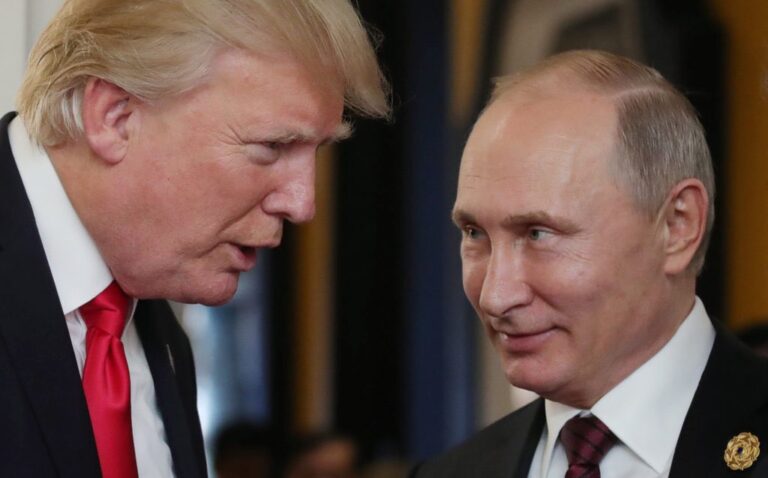While there is a renewed impetus for peace talks in 2025, driven by changes in U.S. leadership and Ukraine’s diplomatic initiatives, significant obstacles remain. The success of any negotiations will depend on the willingness of Russia to engage without demanding excessive concessions, the strategic approaches of the U.S. and European allies, and the broader international context. Therefore, while the chances for peace talks have improved, achieving a lasting resolution will require careful navigation of these complex factors.
As of January 2025, the prospects for peace talks between Ukraine and Russia are influenced by:
1. Change in U.S. Leadership
The inauguration of President Donald Trump has introduced a new dynamic. Trump has expressed a strong desire to “end wars,” with a particular focus on the Ukraine-Russia conflict. His administration is expected to prioritize deal-making that promotes peace while aligning with U.S. strategic interests.
2. Ukraine’s Diplomatic Efforts
Ukrainian President Volodymyr Zelenskyy has been proactive in engaging with the incoming U.S. administration.Efforts include proposing joint investments and leveraging Ukraine’s natural resources to appeal to Trump’s transactional approach. Additionally, Ukrainian officials have been lobbying for continued U.S. support and have even nominated Trump for the Nobel Peace Prize to strengthen relations.
3. Russia’s Stance
Despite economic strains, Russian President Vladimir Putin has shown reluctance to negotiate without significant concessions. Russia may only engage in serious peace talks if faced with increased pressure, such as heightened U.S. sanctions or a more robust military stance from Ukraine’s allies.
4. International Dynamics
The global geopolitical landscape is shifting towards increased bilateralism and nationalism, with challenges to multilateral institutions. This environment complicates the coordination of international efforts to mediate the conflict and may influence the willingness of parties to engage in peace talks.
Peace negotiations on Ukraine should involve the United States:
- Global Influence: The U.S. is a major global power with significant political, economic, and military influence. Its participation ensures that agreements reached are backed by a strong commitment to enforce and support the terms.
- NATO and Security Guarantees: The U.S. is a leading member of NATO and has been a key provider of military aid to Ukraine. Its involvement is critical to shaping and guaranteeing any security arrangements that may arise from negotiations.
- Economic Support: The U.S. has been a major financial backer of Ukraine during the conflict. Ensuring its role in peace talks allows for continuity in economic aid and reconstruction planning post-conflict.
- Balance of Power: Russia, as a primary party in the conflict, has its own strategic interests. U.S. involvement helps counterbalance Russia’s influence and ensures a fairer negotiation process for Ukraine.
- Moral and Strategic Stakes: The U.S. has positioned itself as a defender of democratic values and territorial sovereignty. Its participation reinforces these principles and signals global unity against aggression.
- Long-Term Stability: The U.S. can help broker a durable peace by leveraging its resources and alliances to ensure compliance with the agreement, reducing the risk of future escalations.
Without U.S. involvement, negotiations risk being unbalanced, potentially leaving Ukraine vulnerable to unfavorable terms or undermining the broader international order.
Including territorial compromises in peace talks can be dangerous for several reasons:
1. Violation of International Law
Territorial compromises often reward aggression by legitimizing the illegal seizure of land. This undermines international law, particularly principles like sovereignty and territorial integrity, and sets a dangerous precedent for future conflicts.
2. Encouragement of Future Aggression
If a country gains territory through war or coercion, it signals to other aggressors that similar actions can yield results. This weakens global security and emboldens other nations to resolve disputes through force rather than diplomacy.
3. Erosion of Trust in the Global System
Allowing territorial compromises diminishes trust in international institutions and agreements designed to uphold peace and stability. It could make smaller nations feel vulnerable and less likely to rely on alliances or multilateral organizations for protection.
4. Destabilization of the Region
Ceding territory often leaves unresolved tensions, with displaced populations, ethnic divisions, or future territorial claims creating long-term instability. This can result in ongoing conflict, insurgencies, or frozen disputes.
5. Undermining National Identity and Sovereignty
For countries like Ukraine, territorial compromises can weaken national identity and sovereignty. It risks alienating citizens who feel betrayed by their government and can lead to political and social unrest.
6. Moral Hazard
Negotiating over territory risks signaling that sovereignty is negotiable. This undermines the moral and ethical principles underpinning peaceful conflict resolution and respect for national borders.
7. Difficulty in Enforcement
Even if agreements on territorial compromises are reached, enforcing them can be fraught with challenges, especially if one party refuses to honor the terms or if disputes over implementation arise.
8. Risk of Future Revanchism
Conceding territory may not end the conflict but instead create resentment, fueling desires to reclaim the lost land. This can lead to renewed violence in the future.
Alternative Approach
Instead of territorial compromises, peace talks should focus on measures that respect international law, prioritize humanitarian concerns, and address the root causes of the conflict without undermining sovereignty or rewarding aggression.
For Donald Trump, peace talks, particularly those involving Ukraine and Russia, represent a significant opportunity to achieve several personal, political, and strategic objectives:
1. Strengthening His Legacy
- Trump is known for prioritizing deal-making as a hallmark of his leadership. Successfully brokering peace in Ukraine would bolster his reputation as a global negotiator and peacemaker.
- Achieving a resolution in Ukraine would solidify his place in history as the president who ended a major conflict, potentially elevating his international standing.
2. Domestic Political Gains
- Peace talks could resonate well with his voter base, many of whom value non-interventionist policies and prefer avoiding prolonged foreign conflicts.
- By reducing U.S. financial and military involvement in Ukraine, Trump could claim he is saving American resources, a key talking point for his “America First” agenda.
3. Reinforcing the “Art of the Deal” Image
- Successfully mediating between Ukraine and Russia aligns with Trump’s brand as a master negotiator. He could present himself as the leader capable of cutting through complex issues and delivering tangible results.
4. Geopolitical Leverage
- Facilitating peace talks allows Trump to reshape U.S. foreign policy. He could use the negotiations to reposition the U.S. as a dominant player in global diplomacy while potentially extracting concessions from both sides.
- Trump’s administration might seek to link peace talks to broader strategic goals, such as countering China or enhancing U.S. energy interests in Europe.
5. Relations with Russia
- Trump has often advocated for better relations with Russia. Brokering peace could provide an opportunity to reset U.S.-Russia relations while avoiding perceptions of being too lenient on Moscow.
- He may aim to negotiate terms that satisfy Russia’s interests without compromising Ukraine’s sovereignty, presenting this as a balanced approach.
6. Nobel Peace Prize Aspirations
- Trump has previously expressed interest in receiving the Nobel Peace Prize. Successfully facilitating a resolution in Ukraine could provide him with a compelling case for the honor.
Challenges Trump Faces
- Credibility: Critics might question his neutrality, given his past comments about Russia and Ukraine.
- Complexity: Resolving the conflict requires addressing deep-seated issues like territorial sovereignty, security guarantees, and rebuilding trust between the parties.
- Global Reactions: Allies and adversaries alike will scrutinize his approach to ensure it aligns with international norms and doesn’t undermine global security.
ConclusionFor Trump, peace talks are not just about resolving a conflict; they are a platform to reinforce his leadership image, achieve political victories, and shape his legacy on the global stage. However, navigating the complexities of the Ukraine-Russia conflict will test his ability to balance competing interests while delivering a durable and fair solution.
Russia could significantly influence Donald Trump’s initiatives to end the Ukraine war through a combination of diplomatic maneuvers, strategic demands, and actions on the ground. Here’s how:
1. Setting High Demands for Concessions
- Territorial Claims: Russia might insist on formal recognition of annexed territories (e.g., Crimea and parts of eastern Ukraine), making it difficult for Trump to broker a deal that Ukraine and its allies would accept.
- Demilitarization Zones: Moscow could demand security zones or restrictions on Ukraine’s military activities, limiting Kyiv’s sovereignty.
- Sanctions Relief: Russia might make the lifting of Western sanctions a non-negotiable condition, complicating Trump’s efforts to balance U.S. and international interests.
2. Manipulating Public Opinion
- Propaganda Campaigns: Russia could use state media and disinformation to shape perceptions of the peace process, portraying the U.S. as weak or favoring one side.
- Undermining Credibility: Moscow might question Trump’s ability to act impartially, leveraging his past rhetoric about Russia to sow doubt about his intentions.
3. Escalating or De-escalating Conflict
- Tactical Escalations: Russia could intensify military operations to strengthen its bargaining position or force Ukraine into unfavorable terms.
- Ceasefire Offers: By offering temporary ceasefires or humanitarian gestures, Russia might attempt to gain international favor and pressure Trump to meet its demands.
4. Exploiting Divisions Among Allies
- Fracturing NATO Unity: Russia could exploit disagreements within NATO about the terms of peace, especially if some members favor a quicker resolution at Ukraine’s expense.
- Undermining European Support: Moscow might use energy dependence and economic leverage to sway European countries toward supporting a settlement aligned with its interests.
5. Testing U.S. Resolve
- Prolonging Negotiations: Russia might deliberately stall talks to gauge Trump’s willingness to stay committed to Ukraine or to see if the U.S. shifts focus to other priorities.
- Military Provocations: Actions like border incursions or military build-ups could test U.S. responses and potentially force Trump to adjust his approach.
6. Leveraging Global Alliances
- China and BRICS Influence: Russia might deepen ties with China and other BRICS nations to create a counterbalance to U.S. influence in negotiations.
- Non-Western Mediation: Moscow could push for mediators from neutral or sympathetic countries (e.g., Turkey or India) to sideline U.S.-led efforts.
7. Domestic U.S. Politics
- Exploiting U.S. Divisions: Russia could amplify domestic criticism of Trump’s handling of the war, especially from political opponents, to weaken his position.
- Targeting Trump’s Base: Messaging that aligns with Trump’s “America First” rhetoric could aim to sway public opinion against continued U.S. involvement in Ukraine.
Conclusion
Russia has a wide range of tools to influence Trump’s peace initiatives, from military and diplomatic tactics to leveraging global alliances and exploiting domestic divisions. Successfully navigating these challenges will require Trump to strike a delicate balance between addressing Russia’s demands, supporting Ukraine’s sovereignty, and maintaining U.S. and allied interests.




